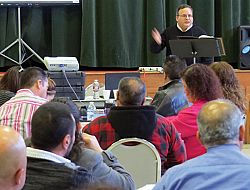Church history presentation teaches those preparing to be lay ministers about the roots of the Catholic faith
Friday, Feb. 17, 2017

IC photo/Laura Vallejo
+ Enlarge
Fr. Marcos Ramos OP presents the weekend-long seminar on Church history to the EMAUS lay ecclesial ministry formation program participants.
Four-year program offers intensive curriculum in human, spiritual, intellectual and pastoral development.
SALT LAKE CITY — The dozens of Hispanic Catholics who participate in the lay ecclesial ministry formation program known as EMAUS II gathered at the Madeleine Choir School on Feb. 11-12 for a two-day presentation on the history of the Catholic Church.
The presentation was part of the four-year program for the more than 60 people from all over the Catholic Diocese of Salt Lake City who are preparing to become Hispanic lay ecclesial ministers. All the participants already are active in parish or diocesan ministries.
Fr. Marcos Ramos OP, who is originally from Puerto Rico, presented the class. He is affiliated with the Congar Institute, which is based in Texas and has partnered with dioceses in the formation of lay pastoral leaders since 2007, providing speakers and other resources.
Fr. Ramos based his talks on the history of the Catholic Church since its beginning.
Church history is important because “this is the way that we learn where we come from. … A lot of times we might have doubts about our faith, mainly because we don’t know why our faith is the way it is, so we learn and investigate who we are, where we come from, what we do. It gives us a capacity to be able to understand better, and to love our Church more,” he said.
Learning about the Church is a human process, he said.
“Because we have the capacity to understand all the processes that have existed, not only the glories – we learn about all the hard moments, the sins, and with all that, the Holy Spirit has given us the saints and a lot of situations that have helped the Church even at its worst to raise up and keep on going,” Fr. Ramos said.
One era that he explained in detail was the Church history of the 14th century, which included the Papal Schism and the foundation of several monastic orders. It was a very controversial time, he said.
Learning about how the Church has changed through history is important, he said.
“For example, back then there were no seminaries; they simply didn’t exist – things like that that we see as normal in today’s world,” said Fr. Ramos, adding that St. Augustine’s saying “We can’t love what we don’t know” is a good example for his talks.
He explained that to be able to love the religion it’s pivotal to be able to know it and know where it comes from “so we can know where we stand and what is our role in the process.”
As Hispanic lay ecclesial ministers in formation Fr. Ramos told the EMAUS II participants that they are all called to be missionaries.
“More than ever in these times we have to go everywhere, to places that we don’t know. … We are called to take the message to everyone; we cannot just be waiting for people like the priest and the nuns to share the message. … If we are going to be leaders in the program, we have to be leaders in the sense of giving support and advice to the people,” he said.
Encouraging the EMAUS II participants to continue despite challenging times, Fr. Ramos compared today’s challenges with the ones that “our ancestors had and lived, and there were worse ones. ... The Church has survived. Our church is not made of angels, it’s made of human beings. We have to love Christ with all our hearts. He will give us the strength to keep on going.”
Maribel Zuazo, one of the EMAUS II participants from Saint Peter and Paul Parish in West Valley City said that the two days learning about the Catholic Church had been exceptionally interesting.
“There were things that I didn’t know,” Zuazo said shortly before the workshop ended. “This has been a great learning experience of what my church is and where we come from. This learning helps me to defend and talk with knowledge about our church.”
For questions, comments or to report inaccuracies on the website, please CLICK HERE.
© Copyright 2024 The Diocese of Salt Lake City. All rights reserved.
© Copyright 2024 The Diocese of Salt Lake City. All rights reserved.

Stay Connected With Us